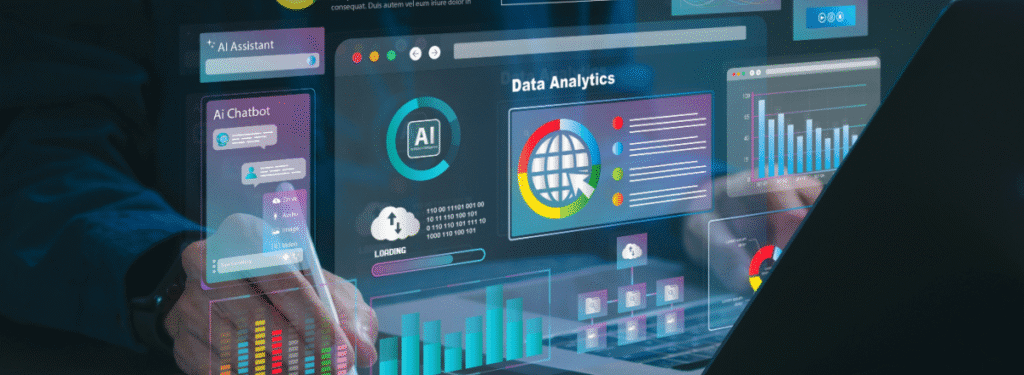AI Tools You Should Actually Use: A Practical Guide for Small Businesses
In today’s fast-moving business world, small business owners are always looking for ways to stay competitive, operate more efficiently, and increase productivity. Enter Artificial Intelligence (AI) – no longer a futuristic concept, but a tangible, practical AI tool for small business owners that can revolutionize how you work. Many fear AI as complex or costly, but the truth is, there are numerous easy-to-use AI solutions for small businesses that are also incredibly affordable AI tools for small business growth.
This article will dive into how AI can genuinely transform your small business, helping you save time, streamline small business operations with AI, and ultimately boost small business productivity using AI. Forget about needing a tech background or a massive budget; the focus here is on accessible, impactful AI tools you can start using today
The AI Advantage: How Small Businesses Can Use AI
Small businesses often operate with limited resources and small teams, making every minute and every dollar count. This is precisely where AI shines.The goal isn’t to replace human ingenuity, but to enhance it. Imagine offloading repetitive, time-consuming tasks to an AI, freeing up your team to focus on strategic initiatives, creativity, and direct customer interaction. This is how AI helps small businesses save time – by automating the mundane. A recent survey from Reimagine Main Street, for instance, revealed that over 50% of small businesses are already exploring AI implementation, with 82% considering it essential to stay competitive.
From automating routine administrative tasks to generating creative content, AI can significantly enhance your operational efficiency. It empowers you to do more with less, leading to genuine business growth without the need for extensive hiring or infrastructure.This section highlights the core of practical AI applications for small businesses.
AI for Content Creation & AI tools for small business Marketing
Marketing is the lifeblood of any small business, but consistently creating engaging content can be a huge drain on resources. AI offers powerful solutions to simplify this, directly contributing to AI tools for small business productivity.
Best AI Tools for Small Business Marketing
Crafting compelling website copy, blog posts, emails, and social media captions can be time-consuming. AI writing assistants are some of the most popular and easy-to-use AI solutions for small businesses in this domain.
Writing Assistants (e.g., ChatGPT/Claude/Gemini, Grammarly, Jasper AI / Copy.ai): These tools can generate ideas, draft entire articles, write product descriptions, and even help with email subject lines. They’re excellent for brainstorming and getting a first draft down quickly, making them practical AI applications for small businesses.
- Image and Video Generators (e.g., Canva with AI, DALL-E / Midjourney, Lumen5 / Synthesia): Visual content is crucial for engaging audiences. AI can help even if you don’t have a design background. These tools allow you to create stunning graphics and professional videos from text prompts. For a deeper dive into how AI is transforming various industries, you might find this article on The Future of AI from MIT Technology Review helpful.
- Social Media Management (e.g., Buffer / Hootsuite with AI features): Many social media management platforms are integrating AI to help you generate post ideas, optimize posting times, and even draft captions, allowing you to streamline small business operations with AI in your marketing efforts.



Source image picked from [Pexel]
AI-powered Social Media Management
Managing multiple social media channels can feel like a full-time job.
- Buffer / Hootsuite (with AI features): Many social media management platforms are integrating AI to help you generate post ideas, optimize posting times, and even draft captions, allowing you to streamline small business operations with AI in your marketing efforts.
AI for Customer Service & Engagement
utstanding customer service is fundamental to small business success. AI can help you provide faster, more personalized support, even when your team is small.
Chatbots and Virtual Assistants
- Tidio / Zendesk AI: AI-powered chatbots can handle common customer inquiries 24/7, providing instant answers to FAQs, guiding customers through processes, or directing them to the right human agent. This dramatically reduces response times and takes pressure off your team, helping to boost small business productivity using AI.
- Automated Email Responses: Many email platforms now offer AI-driven suggestions for replies, saving time and ensuring consistent communication.
Personalized Customer Interactions
- CRM with AI (e.g., HubSpot CRM AI, Zoho CRM with Zia): AI-powered Customer Relationship Management systems analyze customer data to provide personalized recommendations, identify sales opportunities, and predict customer behavior.This enables you to tailor your outreach and enhance customer satisfaction.
AI for Operational Efficiency & Productivity
Beyond customer-facing roles, AI can deeply streamline small business operations with AI across your back-end processes, making your business more efficient and organized.
Project Management & Task Automation
- Notion AI / ClickUp AI: These platforms integrate AI to help with note-taking, project planning, summarizing long documents, and even generating task lists. They can automate repetitive administrative tasks, saving countless hours each week.
- Zapier / Make: While not purely AI, these automation tools allow you to connect various apps and services, creating automated workflows without needing to write a single line of code. For example, you can set up a For instance, Zapier can automatically add new email subscribers to your CRM and trigger a welcome email, saving your team valuable time.”. This is a classic example of how AI helps small businesses save time.



Source image picked from [Google]
Data Analysis & Insights
Making informed decisions is crucial for growth. AI helps turn raw business data into actionable insights.
- Google Analytics (with AI features): This widely used tool now leverages AI to provide deeper insights into your website traffic and user behavior, helping you understand what’s working and what isn’t.
- Financial Software with AI (e.g., QuickBooks AI, Xero): AI can automate bookkeeping, categorize transactions, identify potential errors, and provide predictive insights into your financial health, making financial management much easier. This translates to affordable AI tools for small business growth by reducing manual accounting hours.
Smart Investments: Affordable AI Solutions for Small Businesses
One of the biggest misconceptions is that AI is only for large corporations with huge budgets. This couldn’t be further from the truth. Many Affordable AI solutions for small businesses. come with free tiers, affordable monthly subscriptions, or pay-as-you-go models.
For example, the basic versions of ChatGPT, Canva, and Grammarly are often free and provide substantial value. Many tools designed for small businesses understand the need for cost-effectiveness, making them highly Affordable AI solutions for small businesses. Before investing, explore free trials and basic plans to see what works best for your specific needs. You can often find deals and discounts on software, so it’s always worth checking out resources like Deep Dive Insight Coupons to maximize your savings. For more general resources on growing your small business, the offers valuable guidance. Additionally, for a comprehensive overview of how small businesses are actually using AI, a recent report from Service Direct provides insights into AI adoption trends.
Getting Started with AI: Practical Tips
Adopting AI doesn’t have to be overwhelming. Here’s a simple approach for successful implementation of AI in small business growth:
- Identify Your Pain Points: What tasks are most time-consuming, repetitive, or prone to human error in your business? Start there. Whether it’s answering customer FAQs, drafting social media posts, or managing your calendar, pinpoint the areas where you most need to save time.
- Start Small: Don’t try to overhaul your entire business with AI overnight. Pick one or two specific areas and experiment with relevant tools. For example, try an AI writing assistant for your next blog post, or implement a chatbot for your website’s most common questions.
- Research & Test: Explore different tools and take advantage of free trials. See which ones genuinely fit your workflow and deliver the promised benefits. Look for Affordable AI solutions for small businesses with intuitive interfaces.
- Train Your Team: AI tools are most effective when your team understands how to use them. Provide basic training and encourage experimentation. Remember, AI is a co-pilot, not a replacement for human skills.
- Measure the Impact: Keep an eye on how the AI tools are affecting your business. Are you actually saving time? Is productivity increasing? Are customer interactions improving? This feedback will help you refine your AI strategy.
By strategically integrating these practical AI tools for small business owners, you’re not just keeping up with the times; you’re actively creating a more efficient, productive, and ultimately, more successful business. For more insights and resources on navigating the digital landscape, be sure to explore Deep Dive Insight.
Frequently Asked Questions (FAQs)
Is AI too expensive for a small business?
Not at all! Many great AI tools have free or low-cost plans for small businesses. The time saved and efficiency gained often deliver a strong return on investment despite minimal cost.
Do I need technical skills to use AI tools for my business?
Absolutely not. Most AI tools for small businesses are user-friendly, with intuitive interfaces and drag-and-drop features. No coding skills needed to start benefiting from them.
How quickly can I see results from implementing AI in my small business?
Results vary by tool and use. Simple tasks like content creation or auto-replies show quick gains. Complex setups may take weeks to optimize and assess impact..
Will AI replace human jobs in my small business?
AI works best as a co-pilot, not a replacemen.tAI is most effective as a co-pilot, not a substitute. It handles repetitive tasks, letting people focus on creative, strategic, and customer-focused work—boosting productivity, not cutting job.
What are the biggest risks of using AI for small businesses?
Key risks: data privacy (use secure tools), AI “hallucinations” (wrong info needing human review), and ongoing learning as AI evolves. Always critically review AI-generated content and data..









